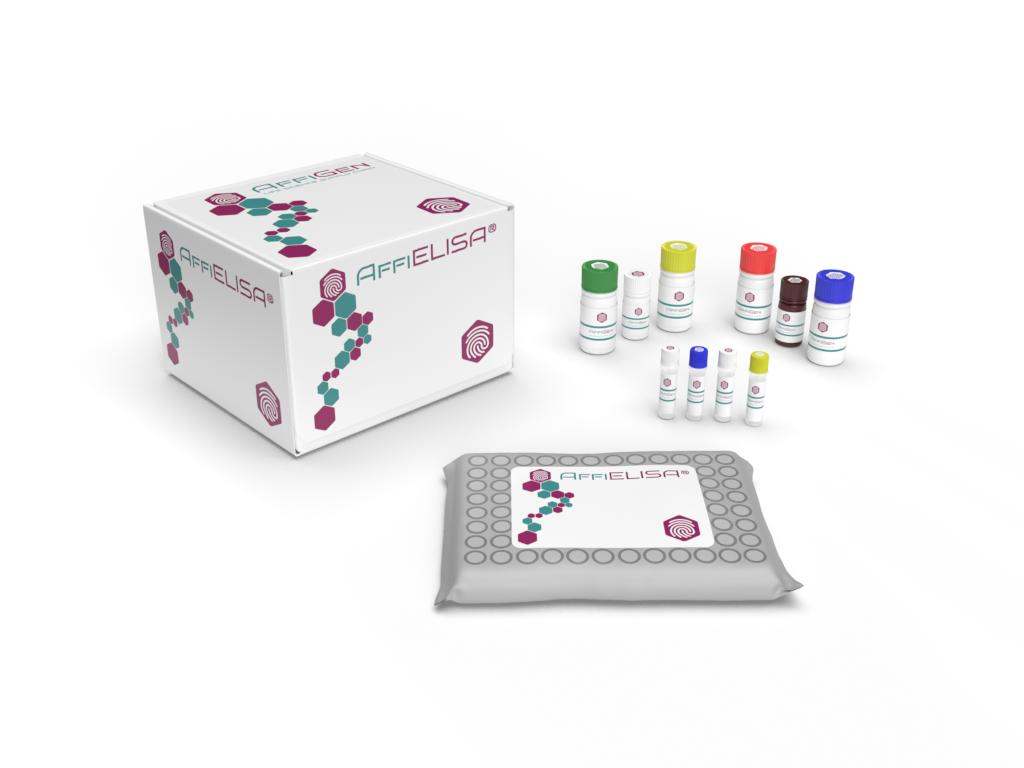AffiELISA® Human staphylococcus aureus enterotoxins, SE ELISA Kit
The AffiELISA® Human Staphylococcus aureus Enterotoxins (SE) ELISA Kit is a laboratory tool designed for the detection and quantitative measurement of specific Staphylococcus aureus (S. aureus) enterotoxins in human samples.
S. aureus is a bacterium that can produce various enterotoxins, which are proteins known to cause food poisoning and other illnesses in humans when ingested. These enterotoxins are heat-stable and resistant to digestion, allowing them to remain active even after cooking food.
ELISA (Enzyme-Linked Immunosorbent Assay) is a widely used laboratory technique that utilizes specific antibodies to detect and quantify particular molecules or proteins in biological samples. This kit utilizes antibodies that specifically recognize S. aureus enterotoxins, enabling the precise measurement and quantification of their concentration in human samples.
The presence of S. aureus enterotoxins in biological samples, particularly in cases of suspected food poisoning or other S. aureus-related illnesses, can be detected using ELISA kits like the AffiELISA® Human SE Kit. This tool aids in identifying and quantifying these enterotoxins, assisting in diagnosing the cause of the illness and investigating outbreaks or instances of foodborne diseases caused by S. aureus.
Detection and quantification of S. aureus enterotoxins using ELISA kits contribute to public health efforts by enabling the rapid identification of these toxins in human samples, allowing for appropriate interventions, investigation of outbreaks, and implementation of preventive measures to ensure food safety and prevent the spread of S. aureus-related illnesses.
Product Specifications
Species
Human
Gene / Target
N/A
Uniprot ID
P02976
Type
Qualitative
Sample Volume
10 µL
Wavelength
450nm
Soybean agglutinin Background
Staphylococcus aureus enterotoxins are protein toxins produced by the bacterium Staphylococcus aureus. These toxins are known for their ability to cause various illnesses in humans, primarily through food poisoning.
Key points about S. aureus enterotoxins:
- Food Poisoning: When S. aureus enterotoxins contaminate food, they can cause foodborne illness characterized by symptoms like nausea, vomiting, abdominal cramping, and diarrhea. Foods commonly implicated include dairy products, meats, salads, and bakery items.
- Heat Stability: These enterotoxins are heat-stable and resistant to digestive enzymes, so they can remain active even after food is cooked or processed, contributing to their ability to cause illness.
- Multiple Types: There are multiple types of S. aureus enterotoxins, typically labeled as SEA, SEB, SEC, SED, SEE, and more, each with its own specific properties and characteristics.
- Diagnosis: In suspected cases of S. aureus-related food poisoning, detection of these enterotoxins in food or clinical samples (such as stool or vomitus) helps confirm the involvement of S. aureus as the cause of illness.
- Public Health Impact: S. aureus enterotoxins contribute significantly to foodborne illnesses worldwide, leading to outbreaks, economic impact, and public health concerns.
Testing methods such as ELISA (Enzyme-Linked Immunosorbent Assay) kits, like the AffiELISA® Human SE ELISA Kit, are designed to detect and quantify these specific enterotoxins in human samples. This aids in identifying the presence and levels of S. aureus enterotoxins, allowing for the prompt diagnosis, investigation of outbreaks, and implementation of preventive measures to ensure food safety and public health.
